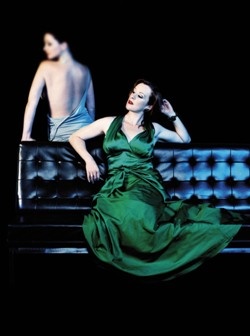Plenty
22/06/2006 - 22/07/2006
Production Details
Written by David Hare
Directed by Katie Wolfe
To know the pleasure of power. To feel the heat of passion. To stretch life to the absolute limit. She would settle for nothing less.
Susan Traherne is transformed by the danger and exhilaration of her operations as a resistance courier in occupied France. Having played the heroine, she returns to a supposedly brave new post-war world, a place of hope and plenty, and finds herself without a role on a stage full of hypocrites. Conflict is used as a construct in order to feel alive.
The ravages of war. The persecution of peacetime. The personal and the political. David Hare creates a moving and passionate account of a life lived in dissent.
from the writer of THE BLUE ROOM and AMY’S VIEW
CAST
Jacqueline Nairn as Susan
Toby Leach as Raymond Brock
David Aston as Darwin and Charleson
Gareth Reeves as Lazar and Mick
Liesha Ward Knox as Dorcas and Louise
Luanne Gordon as Alice
Li Ming Hu as Mme Aung
Edwin Wright as M. Aung, Begley and Frenchman
CREW
Director - Katie Wolfe
Set Design - John Verryt
Lighting Design - Jeremy Fern
Costume Design - Elizabeth Whiting
Sound Design - Drew McMillan
Our website is www.silotheatre.co.nz
Bookings can be made via Ticketmaster, either by phone on 09 970 9700 or online at www.ticketmaster.co.nz.
Theatre ,
Elegant fading of Empire
Review by Nik Smythe 27th Jun 2006
One of the advantages of opening with the last scene in the story (or 2nd to last, to quibble) is that we have an opportunity to deconstruct the ensuing tale told in flashback. We pay more attention to the process by which the protagonist’s life reaches the level of desperation for which we already know she is destined.
In the opening scene of David Hare’s Plenty, where Susan (Jacqueline Nairn) is leaving her naked and unconscious husband, it seems an entertaining comeuppance for a probable scoundrel. But this isn’t a simple Doll’s House catharsis or Hedda Gabler tragedy.
Susan’s life path is explained in scene two. She’s a teenager in Europe, 1943, working for the Resistance. In an encounter with the dapper ‘Codename Lazar’ (Gareth Reeves), a British agent who enters by parachute, Susan explains how wars are won: by knowing as little as possible about your comrades.
This is an attitude Susan cannot seem to shake upon returning to peacetime England. Struggling to achieve independence for herself, she ends up ultimately compromised by marriage to the classic clockwork clerk, Raymond Brock, played with precise repression by Toby Leach.
Luanne Gordon, as Susan’s closest friend Alice Park, is a believably unbelievable stroppy bohemian, whose wanton lifestyle appears to give Susan enough vicarious gratification to put off her own self-discovery for years at a time, though she continues to pine for the opportunity to break free. Using her art as an excuse for hedonism, Alice ("A writer must experience every kind of degradation") is determined to be at the forefront of society’s changing attitudes.
By contrast, Liesha Ward-Knox’s two roles show us a frank innocence which everyone else has lost; in particular schoolgirl Dorcas, who at 17 in 1962 has no direct knowledge of the war (or much else, as it turns out).
For all the self-satisfying indulgence available to women in the burgeoning culture, sex itself seems to be a mere tool for the women to procure what they require from men. Is this entrepreneurial feminism or a hypocritical failure? As for the questions the play raises regarding Susan’s mental health, Edwin Wright’s various appearances as different classes of Frenchman indicate that the notion that free expression equals insanity is a specifically English one. (French farmer: "The English have no feelings." Susan: "They do, but they keep them hidden." French farmer: "They are stupid.")
The pace and elegance of Katie Wolfe’s direction is convincing, as the cast paints us a collage of post-war demographs and lets us witness the ultimate conflict between keeping the peace and living life like there’s no tomorrow. We sympathise with Susan’s despair that the peacetime they’ve invented wasn’t worth ending the war for, yet there is a glimmer of real worth in the stoic Brits’ determination to develop a simple, smoothly run society where you don’t say anything at all if you can’t say anything nice. Sir Andrew Charleston, the Act II replacement head of the Foreign Office to the now deceased Sir Leonard Darwin, surely played on purpose by the same actor (David Aston) with the same impeccably diplomatic yet dark personality, explains: "As our Empire wanes there is little left to believe in – behaviour is all."
An array of quietly delicious costumes care of Elizabeth Whiting John Verryt’s pristinely minimal set reflect the twisted comfort and glory of post-war British culture which David Hare claims, in the programme notes, was the atmosphere he set out to express when he wrote the play nearly thirty years ago. I was impressed by the analogy provided in a Union Jack drawn on the floor in chalk, which got more scuffed and indistinct as the years played out upon it.
Is this play, written in the mid-feminist seventies about the pre-feminist forties and fifties, socially and politically relevant in 2006? Certainly, for both its differences and similarities to today’s social and political issues. Tolerance has grown and developed considerably, and theatre itself may not be the booming industry it once was, but we’ll always be partial to a bit or lots of tasty drama.
Codename Lazar: "Do you know sound waves never die? There is a place somewhere in the corner of the universe where all the babble in the world is kept."
Copyright © in the review belongs to the reviewer







Comments